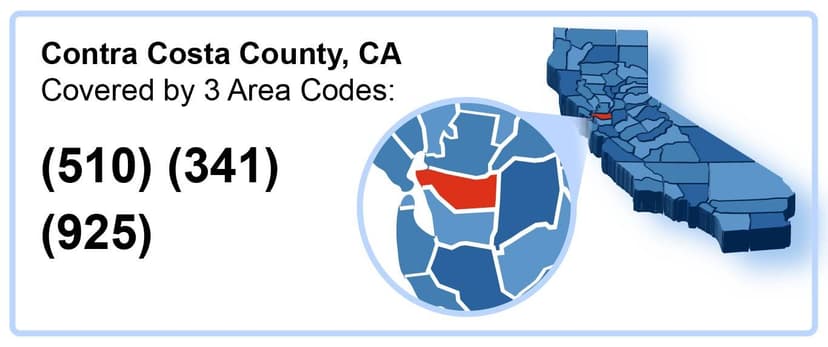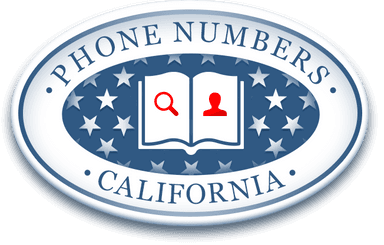What are Contra Costa County Area Codes?

The North American Numbering Plan (NANP) divided the country into different Numbering Plan Areas (NPA) for easy call identification and routing. The NPAs, commonly referred to as area codes, are identified by three-digit numeric codes. Area codes in California are under the supervision of the California Public Utilities Commission (CPUC), as delegated by the Federal Communications Commission (FCC). Contra Costa County currently encompasses three numbering plan areas.
Area code 510 is a California telephone area code activated in 1991 and it covers Contra Costa County and Alameda County. Major cities under this area code are Richmond, San Pablo, Hercules, El Cerrito, Pinole, Rodeo, Tara Hills, and Kensington.
Area code 341 is a California telephone area code introduced in 2019 as an overlay on area code 510.
Area code 925 is a California telephone area code that was split from area code 510 in 1998 and currently extends over Contra Costa and Alameda counties. Cities served by this area code include Concord, Antioch, San Ramon, Walnut Creek, Pittsburg, Brentwood, Danville, Martinez, Oakley, Lafayette, Orinda, Moraga, Clayton, and Pleasant Hill.
What are the Best Cell Phone Plans in Contra Costa County?
Traditional landline telephones are getting displaced from American households by wireless and VoIP telephony services. A CPUC report shows that landline voice services represented 61% of California’s total subscriptions market, as of June 2001. By June 2013, that number had declined to 13.2%. This decline is significant because the same report observed that the communications market grew by 113% in that same period. Wireless voice and broadband services accounted for 68% of the total subscriptions market by June 2013.
Another CPUC report indicated that of the about 57.3 million phone lines in California by December 2018, only about 14.6 million were landlines. Wireless lines accounted for the remaining 42.7 million lines. That 87.6% of the total voice lines included broadband service shows the popularity of VoIP services in the state.
Verizon currently possesses the most comprehensive coverage in California at 77%. AT&T follows closely behind with a coverage of 76.1%. T-Mobile offers 72.7% coverage and Sprint lags with 39.6% coverage.
What are Contra Costa County Phone Scams?
Phone scams are schemes executed via phone calls or text messages to extort money or steal personal information from unsuspecting persons. The proliferation of mobile phones has given criminals an easier means of reaching their targets. The Office of the Attorney General in California has established the common scams in the state. Prevalent phone scams in California include:
What are Charity Scams?
Charity scams are committed by deceiving victims into believing they are donating to charitable causes. Scammers portray themselves as representatives of charity organizations when seeking donations. Residents are advised to ask questions about charities contacting them before giving out money. Any charity’s authenticity can be verified from the Attorney General’s Office or through the Secretary of State. Another way of avoiding this scam is by conducting a reverse phone lookup on the callers’ phone numbers. A phone number lookup can provide information on the caller’s true identity. Victims of charity scams should report to the Attorney General’s Office.
What are Investment Scams
Scammers call targets and inform them about very lucrative business opportunities. Usually, an investment scammer tells their target that the offer is available for just a short time to get them to commit immediately. Residents should do their due diligence on any business opportunities sold to them before investing in them. The Better Business Bureau is a useful resource for researching legitimate companies and commercial organizations. A phone number lookup by address can confirm if the business address given is real. Complaints regarding investment scams should be submitted to the Federal Trade Commission (FTC).
What are Free Trial Offer Scams?
Scammers will call residents and offer free trials of products with subscriptions they claim can be canceled at any time. However, the products arrive long after the free trial would have elapsed, and it becomes very difficult to opt out. The victim is left with bills and regular deductions from their accounts. Contra Costa County residents should understand every term and condition before agreeing to any free trial. Fully understanding what they are getting into will help them avoid subscribing to products and services unintentionally. Monitoring bank statements carefully is also advised. Residents should report any perceived discrepancy to the bank immediately. Victims of this scam can report their experiences to the Attorney General’s Office.
What are Seniors Scams?
Some scams exclusively target senior citizens with scammers conniving to steal their savings. Typically, scammers claim to be grandchildren of targeted seniors and need urgent financial assistance to get out of vaguely described emergencies. In other instances, scammers pose as health officials that require the victims’ Medicare numbers as part of ongoing health checks. Using reverse phone lookups to answer the question, “who is this number registered to?”, can save residents from falling victim to these scams. Victims can use the online complaint form to report this scam to the A.G’s Office.
What are Tech Support Scams?
Scammers pose as support staff of major tech companies to commit these frauds. The aim is to get remote access to the victim’s computer by claiming it has been affected by a virus that can only be removed by accessing the computer. Once given remote access to the machine, they can upload malware that will extract personal information from the computer. Residents are encouraged to verify the true identities of tech support representatives attempting to fix their computers. Victims of this scam need to change all of their passwords to prevent scammers from returning to steal money and information.
Government departments and agencies at every level have platforms for residents to report scams. Reporting scams will curtail its spread and help in arresting fraudsters. Scams can be reported to the Contra Costa Office of the Sheriff online. Reports can also be submitted to the Attorney General’s Office. Federal agencies like the FCC and the FTC are also available to respond to complaints.
What are Robocalls and Spam Calls?
Robocalls relay pre-recorded messages to many phone users and are commonly used by telemarketers and political campaigns. Automatic Dialing Announcing Device (ADAD) that stores thousands of phone numbers is used to place random calls to residents, and deliver the pre-recorded messages. Robocalls are authorized telemarketing tools used to reach several consumers with little efforts. However, scammers have started passing scam messages through robocalls to extort money from Contra Costa County residents. They will promise fake credit repair, mortgage clearance, and other enticing deals to get consumers to commit to their schemes.
The California Legislature passed the Consumer Call Protection Act which enforces more severe punishments on those who commit robocall abuse. Phone manufacturers also provide certain features on mobile phones that can detect and block suspected spam calls. Residents can use these features to block off suspicious calls. Telephone carriers also offer call-filtering and call-blocking services to subscribers.
The following actions should be taken if you are a victim of robocall abuse:
- Ignore calls from unknown numbers.
- Let calls from unknown numbers go through to voicemail and call back those that left messages.
- Do not press any button as instructed by the recorded message. It will only attract more robocalls. End a robocall immediately if you inadvertently picked it.
- Add your number to the National Do Not Call Registry. Registering your number will block off legitimate telemarketers. After doing this, robocalls still reaching your phone are likely from scammers.
- Report any robocall abuses to the FTC.
How to Spot and Report Contra Costa County Phone Scams?
Scammers use several techniques to achieve their goals of extorting money or retrieving personal information. All phone scams employ one or more of these tactics:
- Enticements: Scammers offer very lucrative deals to attract victims. It could be business opportunities, prizes and winnings, credit extension, and free products. Law enforcement authorities warn against falling for deals that look too attractive.
- Urgent decision required: Scammers will also demand immediate action from targets. They will not give their targets enough time to consider the risks of their offers. The fear of missing out makes targets easier to scam.
- Unusual payment methods: Scammers usually request payment through hard-to-trace means like gift cards or wire transfers. When callers claiming to be government officials ask you to make payments in these ways, strongly consider that they are scammers.
- Odd Requests: Instances like a distant grandchild suddenly in need of cash to get out of an emergency are routinely used by scammers. The request may also be in the form of supposed government officials seeking personal information and coercing compliance. Any request that seems out of place should be considered a red flag.
Educating residents of Contra Costa County about the various forms of phone scams is essential. Knowing the different variations of scams will prevent residents from falling victim. Residents are encouraged to follow these agencies’ regular updates to learn more about scams and report any scam activity to them:
The Federal Trade Commission (FTC) is the regulator of the marketplace. They ensure fair dealings between consumers and business owners. They have a comprehensive guide on identifying common phone scams and avoiding robocalls. The National Do Not Call Registry is also under the supervision of the FTC. The FTC has provided a complaint assistance page for victims of scams to lodge complaints.
The Federal Communications Commission (FCC) supervises network operators and the telecommunications industry. They have resources to help identify spoofing and activate call blocking to prevent scams and stop robocall abuse. The FCC is also working with telephone carriers to improve caller authentication services to help eliminate spoofing scams. Victims of scams can report fraudulent activities to the FCC with the FCC’s complaints platform.
The Attorney General’s Office in California has done tremendous work in documenting prevalent scams in the state. The Office provides a way to report scams against the elderly. All other scams can also be reported to the Attorney General’s Office.
The Contra Costa County District Attorney’s Office receives and investigates fraud complaints. Residents can reach the office to report scams by dialing 1 (925) 957-8604. Alternatively, a complaint form can be downloaded and sent back to the office.The Contra Costa County Office of the Sheriff provides multiple ways to report scams and other crimes. An online report can be submitted to the Sheriff’s Office to inform them about any fraudulent activity. The Office of the Sheriff Investigative Division can be reached by dialing 1 (925) 313-2600 to report scams. Anonymous tips can be sent on 1 (866) 846-3592.
